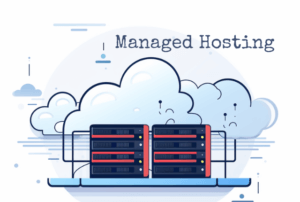Best Website Hosting for Tech Startups
As a tech startup, your agility and responsiveness to change are your greatest assets. To maintain a competitive edge, it’s essential to have a hosting solution that not only meets your current needs but can adapt to future challenges and opportunities. This means selecting the best website hosting company for innovation, scalability, and robust support system.
Providers like AWS, Google Cloud, and Microsoft Azure, are continually evolving, offering cutting-edge services like Kubernetes, serverless computing, and AI-powered analytics.
Understanding the Hosting Needs of Tech Startups often deals with cutting-edge technologies, high traffic volumes, and the need for rapid scalability. Their hosting provider must be robust, flexible, and capable of supporting complex web applications and services.

Key Features for Tech Startup Hosting to Look for
- Scalability: The ability to quickly scale resources up or down depending on traffic and growth.
- Performance and Speed: Essential for providing a seamless user experience and supporting heavy loads.
- Security: Advanced security measures are necessary to protect sensitive data and intellectual property.
- Uptime Reliability: High uptime guarantees to ensure services are always available.
- Technical Support: Access to expert technical support to swiftly address any issues.
- Developer-Friendly Tools: Support for various programming languages, databases, and developer tools.
Jump to Web Hosting Services for Tech Startups
- Kinta Hosting: A premium WordPress hosting provider powered by Google Cloud Platform. It’s known for its high performance and is optimized for WordPress websites. If your startup’s website or application is heavily based on WordPress, Kinsta is a great option.
- AWS (Amazon Web Services): The largest and one of the most comprehensive cloud platforms. AWS provides a massive range of services, including extensive data storage options, computing power, and a vast array of tools for developers. It’s known for its scalability and flexibility, making it a good choice for startups that anticipate rapid growth.
- Google Cloud Platform: Known for its high scalability and performance. It offers a wide range of services including computing, storage, machine learning, and analytics. GCP is particularly strong in big data and machine learning solutions, and it integrates seamlessly with other Google services.
- Microsoft Azure: Offers a wide range of services similar to AWS and GCP. It’s particularly strong in the integration with Microsoft products and services, which can be a significant advantage if your startup relies heavily on tools like Microsoft 365 or Dynamics.
- DigitalOcean: Known for its simplicity and ease of use. It’s a great option for smaller startups or those just beginning to scale. It offers basic services like droplets (virtual machines), managed databases, and storage solutions.

Kinsta
Kinsta, a premium WordPress hosting provider, stands out in the market for several reasons, particularly for its high performance and optimization for WordPress websites. Powered by the Google Cloud Platform, Kinsta offers a range of features that cater to various web hosting needs, particularly for those who prioritize speed and reliability for their WordPress sites.
Speed and Performance: Kinsta utilizes the Google Cloud Platform to ensure fast loading times. This is achieved through strategically placed data centers around the globe, reducing latency and enhancing browsing experiences for visitors.
Automatic Daily Backups: Kinsta provides daily backups of your website, which is crucial for data protection and recovery in case of any mishaps.
Staging Environment: For safer website changes, Kinsta offers a staging environment where you can test modifications before they go live, ensuring error-free updates.
Free SSL Certificates: All hosting plans include free SSL certificates, enhancing your site’s security and trustworthiness. And having your SSL certificate up-to-date keeps the Google Analytics happy, so it’s not a bad reason to keep an eye on this.
Expert Support: Kinsta’s support team is available 24/7 via live chat, providing assistance with any hosting-related issues. The support is known for being prompt and helpful.
Integrated CDN: With an integrated global Content Delivery Network (CDN), Kinsta ensures improved performance by serving your website’s static content from the nearest server to your visitors.
Developer-Friendly Tools: Kinsta offers various tools and features like Git integration, SSH access, WP-CLI, etc., which are beneficial for developers.
Pricing and Plans: Kinsta’s pricing is designed to accommodate different types of users, from small websites to large enterprises. While their pricing may be higher compared to some shared hosting options, the provided performance, security, and customer support justify the cost.
Comparison with Other Hosting Providers: Compared to other popular hosting providers like Bluehost and SiteGround, Kinsta leads in performance due to its integration with Google Cloud Platform. Although Bluehost and SiteGround are reputable, they might experience slower loading times during peak traffic hours.
Security: Kinsta promises robust security standards throughout its hosting infrastructure. Websites hosted by Kinsta are automatically equipped with Cloudflare SSL certificates and are protected against malware, DDoS, and brute force attacks. The platform also offers additional security features like password protection, HTTPS enforcement, automatic updates, IP blocking, and user access monitoring.
Kinsta is a reliable and reputable option for those looking for high-quality managed WordPress hosting. It’s particularly suitable for businesses and individuals who prioritize speed, security, and support. Though the pricing is slightly higher, the value added in terms of performance and features makes Kinsta a considerable choice for those seeking premium WordPress hosting services.

Amazon Web Services (AWS)
Amazon Web Services (AWS) is a comprehensive and broadly adopted cloud platform, offering a wide array of services that cater to various computing needs. As of 2024, it comprises over 200 products and services, including computing, storage, networking, database, analytics, application services, deployment, management, machine learning, mobile, developer tools, and tools for the Internet of Things.
One of the key benefits of AWS is its scalability and flexibility, enabling businesses to adjust resources as needed without substantial upfront capital expenses. This pay-as-you-go pricing model allows enterprises, startups, small and medium-sized businesses, and public sector clients to adapt swiftly to changing business requirements. AWS’s infrastructure is highly reliable and scalable, serving hundreds of thousands of businesses in 190 countries.
Purpose-Built Databases: AWS stands out for its deep functionality within its services, offering a variety of purpose-built databases for different types of applications. This ensures that customers can select the most suitable tools for their specific needs, optimizing both cost and performance. Furthermore, AWS is known for having the largest community of customers and partners, including millions of active customers and tens of thousands of partners globally. This vast network encompasses a range of industries and organization sizes, from startups to large enterprises and public sector organizations.
Security Framework: The platform is designed to be highly secure and flexible, meeting the stringent security requirements of the military, global banks, and other high-sensitivity organizations. AWS boasts over 300 security, compliance, and governance services and features, supporting 143 security standards and compliance certifications. This comprehensive security framework is crucial for businesses handling sensitive data and operations.
Innovation: Continuously introducing new technologies to help businesses transform and grow. For instance, AWS Lambda and Amazon SageMaker have been instrumental in pioneering serverless computing and democratizing machine learning, respectively. These innovations enable developers and scientists to use advanced technologies without requiring extensive prior experience.
Global Reach: AWS has an extensive network of regions and availability zones, making it a recommended choice for running enterprise applications that demand high availability. This extensive infrastructure underpins its capability to deliver cloud services to a diverse and global clientele, with unmatched experience and operational expertise.
Overall, AWS’s combination of a broad range of services, deep functionality, extensive community, strong security measures, rapid pace of innovation, and proven operational expertise makes it a leading choice for businesses seeking a robust and scalable cloud computing solution.

Google Cloud Platform (GCP)
Google Cloud Platform (GCP) has positioned itself as a versatile and powerful cloud service provider, offering a wide range of features and capabilities that are especially beneficial for tech startups and enterprises. Key aspects of GCP include:
Interoperability and Multi-Cloud Support: GCP addresses interoperability requirements through cloud-native services supporting multi and hybrid cloud environments. Solutions like Anthos, BigLake, and BigQuery Omni enable businesses to develop and deploy platform-agnostic applications, avoiding vendor lock-in and supporting diverse cloud infrastructures.
Future-Focused Infrastructure: GCP offers powerful compute engines with various NVIDIA GPUs on Google Compute Engine, suitable for executing AI/ML models. The Kubernetes Engine is gaining attention for deploying containerized applications, offering the ability to use GPUs and tensor processing units as part of the infrastructure.
Operational and Analytical Database Solutions: GCP provides a range of database solutions for both operational and analytical data processing. Enhanced services like Cloud Bigtable, Alloy DB, and DataStream for BigQuery cater to both operational and analytical database needs.
Enhanced Security: GCP has expanded partnerships with security solution providers, integrating security operations capabilities and enabling teams to manage alerts more effectively. The Google Cloud Security Operations solution converges security operations capabilities for more efficient management.
Application Modernization: GCP offers comprehensive capabilities for modernizing applications, including accelerating traditional app modernization into native containers. Anthos plays a significant role in building new applications and upgrading existing ones for increased agility.
SAP Integration: GCP is focusing on ERP transformation, particularly for SAP workloads, by integrating Google’s AI, ML, and advanced analytics capabilities to maximize insights from SAP data.
Market Position and Growth: Over the past five years, Google’s share of the cloud market has nearly doubled, reflecting its growing influence in the cloud services sector. Although it operates at a loss, GCP’s revenue and market share have been growing, especially across different segments like startups, mid-market, and enterprises.
Versatile Data Management and Storage Solutions: GCP provides various data management and storage solutions, including Cloud Storage for unstructured data, Cloud SQL for relational data, BigQuery for data warehousing, and Firestore for NoSQL data. Each solution is tailored to meet different data handling requirements.
Robust Security and Compliance: GCP’s security and compliance features, including Identity and Access Management (IAM), data encryption, and network security, ensure the protection and integrity of data and applications. These features are crucial for maintaining a secure and compliant cloud environment.
GCP’s diverse and comprehensive offerings make it a strong contender for tech startups requiring high-level data storage and a range of services to support their growth and development. The platform’s flexibility, scalability, and integration with advanced technologies like AI and ML are particularly beneficial for startups looking to leverage the latest in cloud computing.
Microsoft Azure
Microsoft Azure, as of 2024, continues to be a major player in the cloud computing industry, offering a comprehensive range of more than 200 products and services. It’s widely employed by numerous well-known companies such as Verizon, LG Electronics, CenturyLink, LinkedIn, Intel, and Adobe. In fact, 95% of Fortune 500 companies use Azure for their digital transformation needs.
The platform is particularly noted for its integration with various Microsoft products and services, which makes it a valuable choice for businesses already using Microsoft’s ecosystem, like Microsoft 365 or Dynamics.
Azure’s offerings are diverse, covering areas like virtual machines, app services, cloud services, and encompassing Software as a Service (SaaS), Platform as a Service (PaaS), Infrastructure as a Service (IaaS), and serverless computing. These services are provided on a pay-as-you-go basis, which allows businesses to scale resources as needed, thus optimizing costs and improving operational efficiency. The benefits of using Azure include reduced overall costs, improved agility through automation and self-provisioning, and the ability to instantly access applications globally.
In 2024, Microsoft Azure continues to focus on democratizing AI, evident from its partnership with OpenAI, known for AI innovations like ChatGPT, DALL-E2, and GitHub Copilot. Azure OpenAI Service, now generally available, allows businesses to access advanced AI models on Azure infrastructure to create cutting-edge applications.
Additionally, Azure has been placing a significant emphasis on IoT for supply chain optimization. The platform is working with Microsoft Cloud partners to provide Azure-optimized solutions for retail customers, focusing on inventory optimization, enhancing customer experience, empowering frontline workers, and managing loss prevention. Azure IoT Central is a notable offering in this sector, providing a comprehensive management and analytics dashboard for IoT deployments.
Azure’s security capabilities have also been strengthened, with the recent introduction of a new Azure DDoS Protection Solution for Microsoft Sentinel. This solution enables customers to identify and respond to security threats, enhancing the overall security posture of Azure deployments.
These developments and features make Microsoft Azure an appealing choice for businesses looking to leverage cloud computing for a range of applications, from AI and IoT to general data management and security. Azure’s ability to seamlessly integrate with Microsoft’s product suite and its robust security and AI capabilities position it as a strong option for businesses seeking a comprehensive cloud service provider.

DigitalOcean
DigitalOcean is a renowned cloud hosting provider that offers a variety of services and features, making it an excellent choice for smaller startups or businesses beginning to scale. Here’s an overview of what DigitalOcean provides, focusing on its key features, pricing plans, and advantages and disadvantages.
Droplets: DigitalOcean’s primary offering is its virtual machines called Droplets, which are Linux-based and come in various configurations. They are quick to set up and suitable for hosting websites, running applications, etc. DigitalOcean offers both shared CPU and dedicated CPU plans.
Kubernetes: For those interested in containerized applications, DigitalOcean provides a managed Kubernetes service. This includes automated updates and scaling, and it’s cost-effective since you pay only for the worker nodes.
Storage Solutions: DigitalOcean offers Spaces Object Storage for storing large amounts of unstructured data and Volumes Block Storage, which provides scalable block storage that can be attached to Droplets.
Networking Features: The service includes Cloud Firewalls for security, Load Balancers for distributing traffic, and a Virtual Private Cloud for creating isolated networks.
Database Management: DigitalOcean offers managed databases for popular systems like MongoDB, PostgreSQL, MySQL, and Redis.
Developer Tools: The platform provides an extensive range of developer tools, including APIs, CLI, and integrations with tools like GitHub.
Pricing Plans: DigitalOcean’s pricing is known for its affordability and transparency. The plans start as low as $5 per month for Standard Droplets, going up to higher tiers for more resource-intensive needs. The General Purpose Droplets start at $60 per month, CPU-Optimized Droplets at $40 per month, and Memory-Optimized Droplets at $135 per month.
What are Kubernetes?
Imagine you have a bunch of tiny computers (servers) that you use to run your website or application. Normally, managing these servers individually can be like juggling too many balls at once – it’s complicated and things can easily go wrong. Kubernetes is like a smart assistant that helps you manage these servers. It organizes them, ensures they work well together, and helps them handle more visitors to your website efficiently.
In the context of DigitalOcean, they offer Kubernetes as a service. This means that instead of setting up and managing Kubernetes yourself (which can be complex), DigitalOcean does it for you. They provide a platform where Kubernetes is already set up, and you can use it to manage your servers more easily. This service helps your website or application to scale (grow or shrink) based on how many people are using it, without you having to worry about the details of server management.
So, in summary, Kubernetes on DigitalOcean is a tool that helps you manage multiple servers for your website or application, making it easier to handle changes in traffic and ensuring everything runs smoothly.
Choosing the Right Website Hosting for Your Startup
• Evaluate the technical requirements of your product or service.
• Consider the level of customer support you might need.
• Factor in your growth projections to ensure the hosting can scale with your startup.
Budget Considerations – Best Website Hosting for Tech Startups
• Startups must balance cost with functionality. While free or low-cost options might be tempting, consider the long-term impact on performance and scalability.
• Look for hosting providers that offer startup-friendly pricing or credits.
Security and Compliance
• Given the nature of tech startups, prioritize hosts that offer robust security features and compliance with industry standards.
Best Website Hosting for Tech Startups
Choosing the right web hosting service is a critical decision for tech startups. Services like AWS, Google Cloud Platform, Kinsta WordPress Hosting, Microsoft Azure, DigitalOcean, and Heroku offer a range of features that cater to the dynamic and demanding needs of the tech industry. The best choice will depend on the specific technological needs, budget constraints, and growth expectations of the startup.
Staying Agile and Informed
In essence, choosing a hosting provider is not a one-time decision but an ongoing process of adaptation and alignment with your startup’s evolving needs. Stay informed, be flexible, and choose a hosting solution that grows with you.






